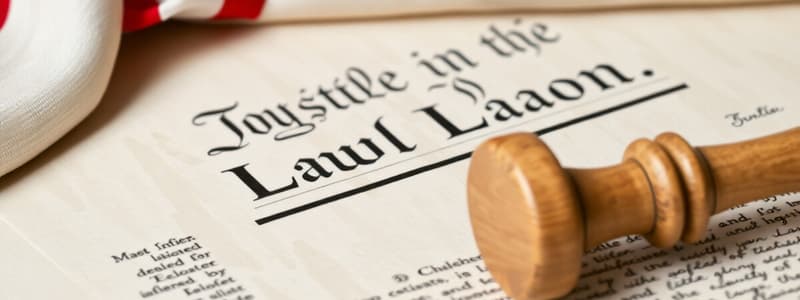Podcast
Questions and Answers
Does a constitutional challenge to a state's legislative map present a political question?
Does a constitutional challenge to a state's legislative map present a political question?
True (A)
Why or why not?
Why or why not?
This is considered a political question because it involves the balance of power between state and federal governments. It’s also related to political considerations such as the fairness of elections.
Did the Framers of the 14th Amendment intend it to apply the Bill of Rights to the States?
Did the Framers of the 14th Amendment intend it to apply the Bill of Rights to the States?
False (B)
How strong is Federalism?
How strong is Federalism?
What is the role of the judiciary?
What is the role of the judiciary?
What was a significant outcome of the judicial review established in Marbury v. Madison?
What was a significant outcome of the judicial review established in Marbury v. Madison?
The Judiciary Act of 1789 played no role in establishing the power of the judicial branch.
The Judiciary Act of 1789 played no role in establishing the power of the judicial branch.
What role does judicial oversight play in the context of legislation?
What role does judicial oversight play in the context of legislation?
The outcome of judicial review can fundamentally change a piece of __________.
The outcome of judicial review can fundamentally change a piece of __________.
Match the following key events to their significance:
Match the following key events to their significance:
What did the Supreme Court establish in Marbury v. Madison (1803)?
What did the Supreme Court establish in Marbury v. Madison (1803)?
The Constitution explicitly grants the Supreme Court the authority of judicial review.
The Constitution explicitly grants the Supreme Court the authority of judicial review.
Who was the Chief Justice who wrote the opinion in Marbury v. Madison?
Who was the Chief Justice who wrote the opinion in Marbury v. Madison?
The concept of __________ interprets the Constitution based on the intentions of its framers.
The concept of __________ interprets the Constitution based on the intentions of its framers.
Which of the following best describes the term 'judicial review'?
Which of the following best describes the term 'judicial review'?
Judicial review has no significant impact on the balance of power between government branches.
Judicial review has no significant impact on the balance of power between government branches.
The Supreme Court is less accountable to __________ compared to Congress and the Executive.
The Supreme Court is less accountable to __________ compared to Congress and the Executive.
Match the following terms with their definitions:
Match the following terms with their definitions:
Flashcards
Political Question
Political Question
A question or issue that a court decides is beyond its power or authority to resolve because it involves policy choices or processes left to other branches of government.
Constitutional Precedent
Constitutional Precedent
A prior judicial decision on a similar legal question that serves as a ruling guide in subsequent cases.
Federalism
Federalism
The division of power between a central government and other regional governments (e.g., States)
Judicial Review
Judicial Review
Signup and view all the flashcards
Strict Originalism
Strict Originalism
Signup and view all the flashcards
Non-interpretivism
Non-interpretivism
Signup and view all the flashcards
Impact of Judicial Review
Impact of Judicial Review
Signup and view all the flashcards
Judicial Review: Changing Legislation
Judicial Review: Changing Legislation
Signup and view all the flashcards
Legislative Response to Judicial Review
Legislative Response to Judicial Review
Signup and view all the flashcards
Marbury v. Madison: Historical Significance
Marbury v. Madison: Historical Significance
Signup and view all the flashcards
Constitutionality in a Changing World
Constitutionality in a Changing World
Signup and view all the flashcards
Marbury v. Madison
Marbury v. Madison
Signup and view all the flashcards
Writ of Mandamus
Writ of Mandamus
Signup and view all the flashcards
Original Jurisdiction
Original Jurisdiction
Signup and view all the flashcards
Originalism
Originalism
Signup and view all the flashcards
Modernism
Modernism
Signup and view all the flashcards
Stare Decisis
Stare Decisis
Signup and view all the flashcards
Precedent
Precedent
Signup and view all the flashcards
Study Notes
Hypothetical Scenario Questions
- A state is experiencing significant population changes over decades, resulting in out-of-date and racially disproportionate legislative district maps. Citizens are suing the state to force them to update the map.
- Does a constitutional challenge to a state's legislative map present a political question?
- Why or why not?
Incorporation of Individual Liberties
- With respect to the incorporation of individual liberties, there are two prevailing schools of thought: Incorporationists and Selective incorporationists (A.K.A. Selectivists).
- Did the Framers of the 14th Amendment intend it to apply the Bill of Rights to the States?
- How strong is Federalism?
- What is the role of the Judiciary?
Studying That Suits You
Use AI to generate personalized quizzes and flashcards to suit your learning preferences.
Description
This quiz explores the political questions surrounding legislative district maps and the impact of the 14th Amendment on individual liberties. Analyze the constitutional challenges related to population shifts and the differing views on the incorporation of the Bill of Rights. Engage with key concepts of Federalism and the role of the Judiciary.




